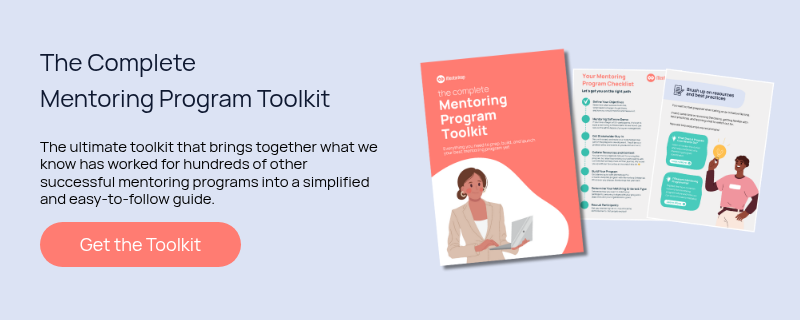Mentoring is a valuable and important practice that can have a profound impact on the mentee’s professional development and personal growth. A good mentoring relationship involves regular communication, mutual trust and respect, and a focus on the mentee’s goals and needs. In this article, we will explore some mentoring activities that you can do with your mentoring partner to help them grow and achieve their potential.
One of the key elements of a successful mentoring relationship is setting goals and objectives. This involves having regular conversations with your mentoring partner to discuss their goals and what they hope to achieve through the mentoring relationship. This can be done through a variety of activities, such as setting SMART (specific, measurable, achievable, relevant, and time-bound) goals, creating a personal development plan, or using a goal-setting tool like the OKR (Objectives and Key Results) framework. By setting clear goals and regularly reviewing progress towards those goals, you can help your mentee stay focused and motivated, and ensure that the mentoring relationship is moving in the right direction.
Another important aspect of mentoring is providing support and guidance. This can take many forms, such as offering advice and insights based on your own experiences, providing access to resources and connections, and giving constructive feedback to help your mentee improve and grow.
There are many different activities you can do with your mentoring partner to provide this type of support, let’s take a look at some of the most important ones first.
Keen to skip ahead? Check out the 50 mentoring activities you need to try checklist.
Mentoring activities you need to try during your next meeting:
Sharing your own experiences and lessons learned
This can be done through informal conversations or more structured discussions, such as sharing a case study or presenting a problem-solving scenario. By sharing your own experiences and the challenges you have faced, you can help your mentee see that they are not alone and that there are many different ways to approach and solve problems.
Connecting your mentee with resources and connections
One of the most valuable things you can do as a mentor is to help your mentee access the resources and connections they need to grow and succeed. This can include sharing articles, books, or websites that you find helpful, introducing your mentee to people in your network who can provide valuable advice or support, or helping your mentee find professional development opportunities or networking events.
Stuck? Here are some of our favourites:
Many TED talks and books can provide valuable insights and guidance for a mentee. Some of the top TED talks that may be helpful for a mentee include:
- “The Power of Vulnerability” by Brené Brown: In this talk, Brown discusses the importance of vulnerability and authenticity in building trust and connection with others. She provides valuable insights into how to overcome fear and shame, and how to be vulnerable in a way that allows for true connection and growth.
- “Your Body Language Shapes Who You Are” by Amy Cuddy: In this talk, Cuddy discusses the power of body language, and how our posture and movements can affect our thoughts, feelings, and behaviors. She provides valuable insights into how to use body language to improve our confidence, communication, and leadership skills.
- “The Surprising Science of Happiness” by Dan Gilbert: In this talk, Gilbert discusses the science of happiness, and how our brains often misjudge what will make us happy. He provides valuable insights into how to cultivate a sense of happiness and well-being, and how to overcome the biases and assumptions that can prevent us from achieving it.
Books more your style? Some of the top books that may be helpful for a mentee include:
- “The 7 Habits of Highly Effective People” by Stephen Covey: This classic book provides a framework for developing personal and professional effectiveness, based on seven key habits: being proactive, setting priorities, thinking win-win, seeking first to understand, synergizing, sharpening the saw, and finding your voice and your mission.
- “How to Win Friends and Influence People” by Dale Carnegie: This bestselling book provides practical advice and strategies for building relationships, improving communication, and influencing others. It includes a wealth of valuable insights and tips on how to be a better listener, how to communicate effectively, and how to handle difficult people.
- “Mindset: The New Psychology of Success” by Carol S. Dweck: This book discusses the power of mindset, and how our beliefs and attitudes can shape our abilities and our success. It provides valuable insights into how to cultivate a growth mindset, and how to overcome the limitations of a fixed mindset.
Providing feedback and coaching
Regular feedback is an essential part of any mentoring relationship, as it helps your mentee see where they are making progress and where they need to improve. This can be done through informal conversations or more structured feedback sessions, such as using a feedback tool like the 360-degree feedback model. By providing regular feedback and coaching, you can help your mentee develop new skills and behaviors that will help them achieve their goals.
Another important aspect of mentoring is helping your mentee develop their skills and abilities. This can be done through a variety of activities, such as providing opportunities for learning and development, helping your mentee practice and apply new skills, and offering support and guidance as they develop their expertise.
Mentoring activities you can do with your mentoring partner to develop their skills and abilities
Providing learning and development opportunities
One of the best ways to help your mentee develop their skills and abilities is to provide them with opportunities for learning and development. This can include sharing articles, books, or websites that you find helpful, attending workshops or seminars together, or enrolling in a training program or course. By providing your mentee with these types of opportunities, you can help them gain new knowledge and skills that will benefit them in their career.
Helping your mentee practice and apply new skills
In addition to providing learning and development opportunities, it’s also important to help your mentee practice and apply the new skills they have learned:
Role-playing and scenario planning
Role-playing and scenario planning are mentoring activities that involve simulating real-life situations or scenarios in order to practice and develop skills and abilities. Role-playing involves taking on different roles and acting out a scenario, while scenario planning involves creating a plan for how to approach and solve a problem or challenge.
These activities can be very beneficial in a mentoring relationship, as they provide a safe and controlled environment for the mentee to practice and develop new skills and behaviours. They can also help the mentee gain a deeper understanding of different perspectives and approaches to problem-solving.
Some examples of how to use these activities in a mentoring relationship:
There are many different ways to use role-playing and scenario planning in a mentoring relationship. For example, you and your mentee could role-play a difficult conversation or negotiation, or create a scenario planning exercise to practice decision-making or conflict resolution. You could also use these activities to help your mentee develop their communication skills, leadership abilities, or problem-solving strategies.
The importance of debriefing and reflection
The key to making these activities effective is to debrief and reflect on the experience. After role-playing or scenario planning, it’s important to take some time to discuss what happened and what was learned. This can help your mentee gain insights and perspectives that they might not have considered during the activity. It can also help them identify areas for improvement and develop strategies for overcoming challenges.
Overall, role-playing and scenario planning are valuable mentoring activities that can help your mentee develop new skills and behaviours, gain a deeper understanding of different perspectives, and improve their problem-solving abilities. By debriefing and reflecting on the experience, you can help your mentee get the most out of these activities and continue to grow and develop.
Action learning
Action learning is a mentoring activity that involves learning through experience and reflection. In an action learning situation, the mentee is presented with a real-life problem or challenge and is encouraged to think critically and creatively to find a solution. The mentee is then supported and guided by the mentor as they implement their solution and reflect on the results.
Action learning has many benefits in a mentoring relationship. It allows the mentee to gain practical experience and apply their knowledge and skills in a real-world setting. It also encourages creativity and critical thinking, as the mentee is challenged to come up with their own solution to the problem or challenge. Additionally, action learning fosters collaboration and teamwork, as the mentee is often working with others to implement their solution.
Some examples of how to use action learning in a mentoring relationship:
There are many different ways to use action learning in a mentoring relationship. For example, you and your mentee could identify a real-life problem or challenge that they are facing and work together to come up with a solution. You could also use action learning to help your mentee develop their leadership skills by providing them with opportunities to lead a team or project.
The key to making action learning effective is to encourage self-reflection and feedback. As the mentee is implementing their solution, it’s important for them to regularly reflect on their progress and the results they are achieving. This can help them identify areas for improvement and adjust their approach as needed. It’s also important for the mentor to provide regular feedback and support, as this can help the mentee stay on track and continue to learn and grow.
Overall, action learning is a valuable mentoring activity that can help your mentee gain practical experience, develop their critical thinking and leadership skills, and foster collaboration and teamwork. By encouraging self-reflection and providing regular feedback, you can help your mentee get the most out of the action learning experience and continue to grow and develop.
Reflective practice
Reflective practice is a mentoring activity that involves regularly taking time to reflect on your experiences, thoughts, and emotions in order to gain insights and improve your performance. Reflective practice can help you develop self-awareness, identify areas for growth and development, and gain a deeper understanding of your strengths and weaknesses.
In a mentoring relationship, reflective practice can be a valuable tool for both the mentor and the mentee. By regularly taking time to reflect on their experiences and thoughts, both parties can gain insights and perspectives that can help them grow and develop. Reflective practice can also help build trust and understanding between the mentor and mentee, as it involves sharing personal thoughts and experiences in a safe and supportive environment.
There are many different ways to use reflective practice in a mentoring relationship. For example, you and your mentee could set aside time at the end of each mentoring session to reflect on what was discussed and what was learned. You could also use reflective practice as a tool to help your mentee process and learn from difficult experiences or challenges.
The key to making reflective practice effective is to make it a regular part of the mentoring relationship. It’s important to set aside dedicated time for reflection, and to create a safe and supportive environment where both parties feel comfortable sharing their thoughts and experiences. By regularly reflecting on their experiences, both the mentor and mentee can gain insights and perspectives that will help them grow and develop.
Overall, reflective practice is a valuable mentoring activity that can help both the mentor and mentee gain self-awareness, identify areas for growth, and build trust and understanding. By making reflective practice a regular part of the mentoring relationship, you can help both parties continue to learn and grow.
Sponsorship and Advocacy
Sponsorship and advocacy are mentoring activities that involve supporting and advocating for your mentee’s professional growth and success. As a sponsor, you provide your mentee with opportunities to develop their skills and advance their career, and you advocate for them within your organization or industry. As an advocate, you support your mentee by providing guidance and advice, sharing your network and resources, and offering encouragement and support.
Sponsorship and advocacy can be very beneficial in a mentoring relationship, as they can help your mentee gain the support and opportunities they need to succeed. Sponsorship can provide your mentee with valuable experiences and opportunities that can help them develop their skills and advance their career. Advocacy can help your mentee feel supported and encouraged and can help them navigate challenges and obstacles that they may face.
Some examples of how to use these sponsorship and advocacy activities in a mentoring relationship:
There are many different ways to use sponsorship and advocacy in a mentoring relationship. For example, you could sponsor your mentee by providing them with opportunities to work on challenging projects or to participate in professional development programs. You could also advocate for your mentee by sharing your network and connections, offering advice and support, and providing encouragement and motivation.
The key to making sponsorship and advocacy effective is to consistently support and advocate for your mentee’s professional growth and success. This means being proactive in seeking out opportunities and providing guidance and support, and being committed to helping your mentee achieve their goals. By consistently supporting and advocating for your mentee, you can help them gain the skills and experiences they need to succeed in their career.
Overall, sponsorship and advocacy are valuable mentoring activities that can help your mentee gain the support and opportunities they need to succeed. By consistently supporting and advocating for your mentee, you can help them achieve their goals and achieve their full potential.
Here are 50 mentoring activities you can do with your mentee:
- Attend a networking event or career fair together.
- Practice job interviewing and provide feedback.
- Create a personal development plan.
- Conduct a skills assessment and discuss areas for growth.
- Attend a professional development workshop or training program together.
- Discuss and review the mentee’s career goals and aspirations.
- Set and track progress towards SMART goals.
- Discuss and review the mentee’s job performance and provide feedback.
- Develop and practice effective communication skills.
- Create a career plan and explore potential job opportunities.
- Discuss and review the mentee’s work-life balance and provide guidance.
- Share and discuss articles, books, or other resources on professional development.
- Attend a public speaking or presentation skills workshop together.
- Role-play difficult conversations or negotiations.
- Create and practice a scenario planning exercise.
- Conduct a 360-degree feedback session.
- Provide guidance on networking and building professional relationships.
- Discuss and review the mentee’s leadership skills and provide feedback.
- Develop and practice time management and organizational skills.
- Explore and discuss potential career paths and opportunities.
- Provide guidance on how to prepare for and succeed in job interviews.
- Conduct a mock job interview and provide feedback.
- Develop and practice problem-solving and critical thinking skills.
- Discuss and review the mentee’s work-related stress and provide support.
- Provide guidance on how to advance in the mentee’s career and achieve their goals.
You’re halfway there!
- Provide guidance on how to negotiate salary and benefits.
- Share your own career experiences and lessons learned.
- Discuss and review the mentee’s work-related challenges and provide support and guidance.
- Attend a leadership development program or seminar together.
- Discuss and review the mentee’s personal brand and provide guidance on how to develop and promote it.
- Share your own professional network and connections with the mentee.
- Discuss and review the mentee’s professional goals and aspirations, and provide support and guidance.
- Attend a team-building or collaboration workshop together.
- Discuss and review the mentee’s communication skills and provide feedback.
- Provide guidance on how to manage and develop a team.
- Share your own experiences and lessons learned from failure and setbacks.
- Discuss and review the mentee’s work-related challenges and provide support and guidance.
- Attend a negotiation skills training program together.
- Discuss and review the mentee’s career plan and provide guidance and support.
- Provide guidance on how to develop and maintain a professional online presence.
- Share your own experiences and lessons learned from success and achievements.
- Discuss and review the mentee’s leadership skills and provide feedback and support.
- Provide guidance on how to manage and navigate workplace politics.
- Share your own experiences and lessons learned from mentoring others.
And just five more:
- Discuss and review the mentee’s work-related goals and provide support and guidance.
- Provide guidance on how to develop and maintain a professional network.
- Share your own experiences and lessons learned from challenges and adversity.
- Discuss and review the mentee’s personal and professional values, and provide guidance on how to align their actions with those values.
- Provide guidance on how to manage and overcome impostor syndrome.
Inspired to start your own mentoring program?
These ideas should provide some inspiration for your participants’ next mentorship activity. But if you feel overwhelmed, our team of professionals can help. Mentorloop mentoring software can help you build a top-notch mentoring program! Just book a call with our team to learn more about how the Mentorloop platform can bring a culture of mentoring to your organization.






